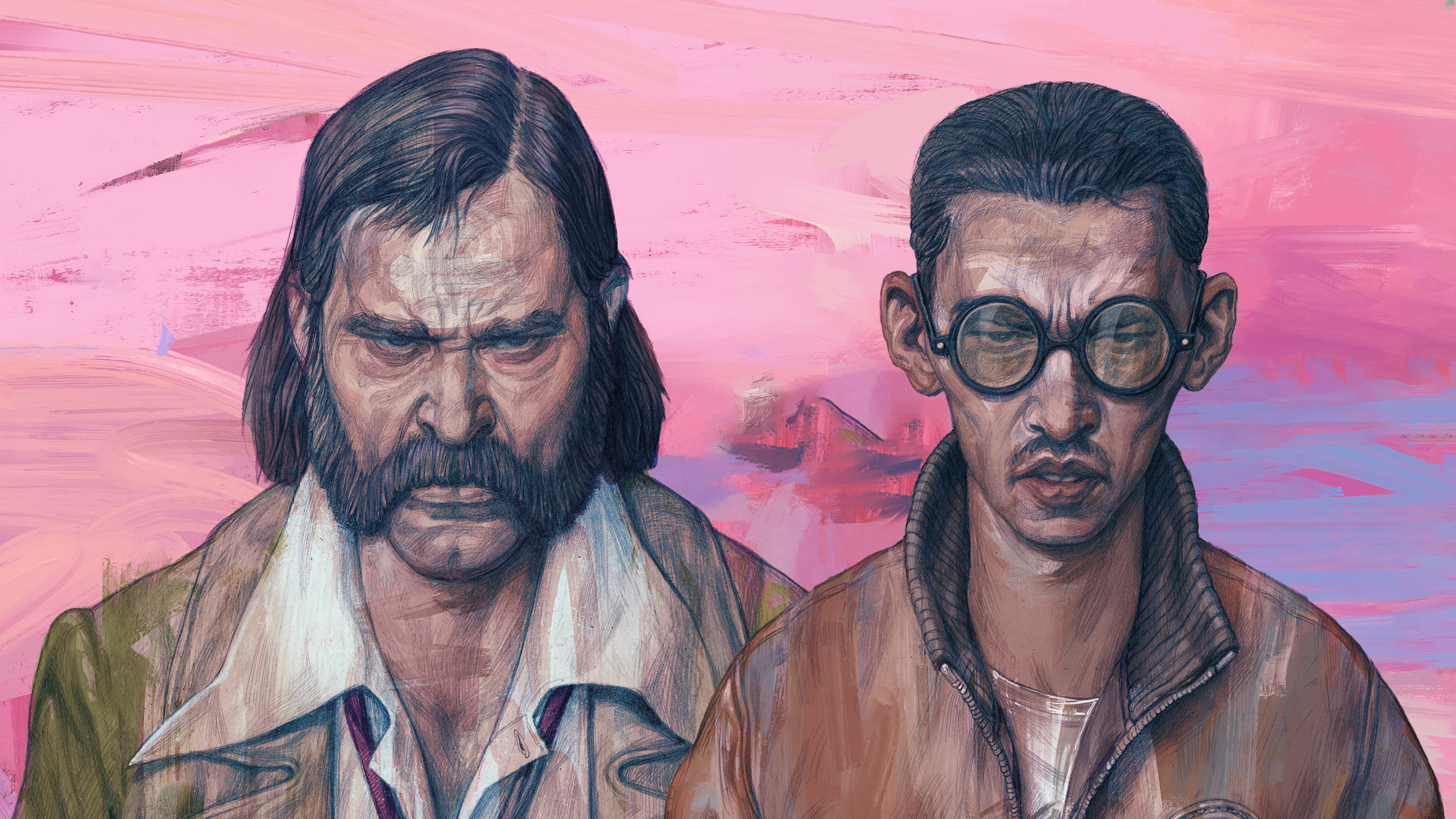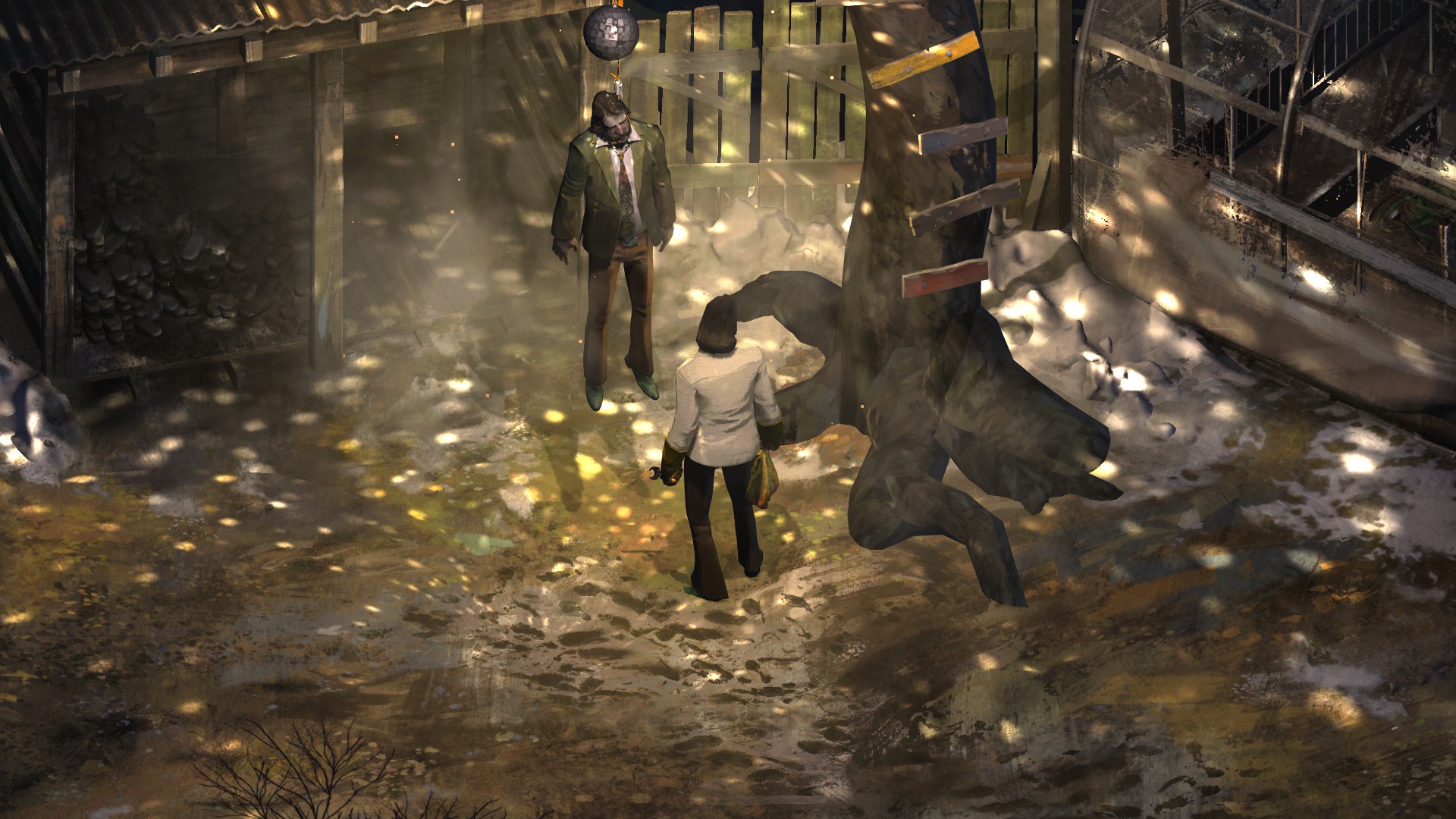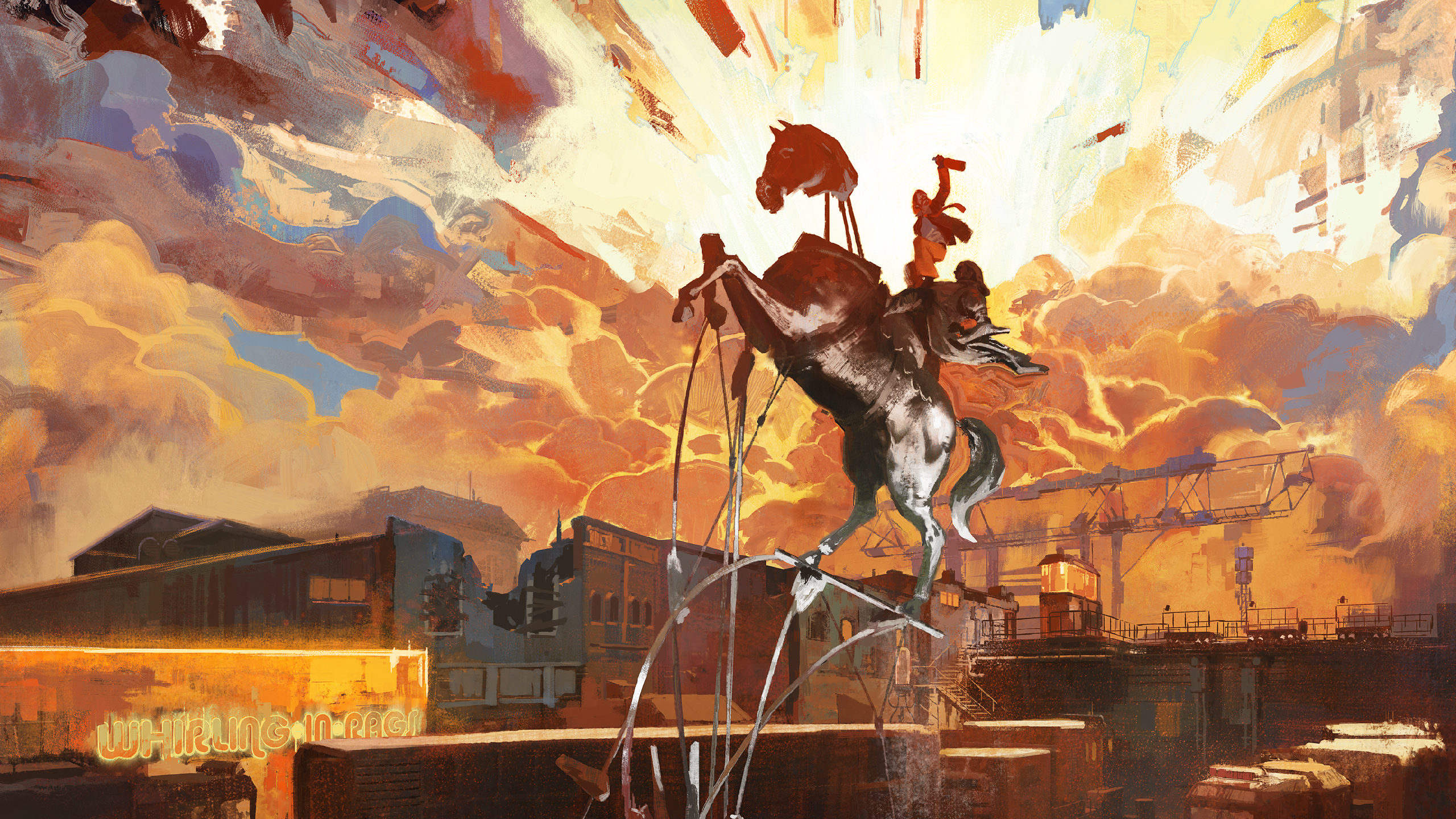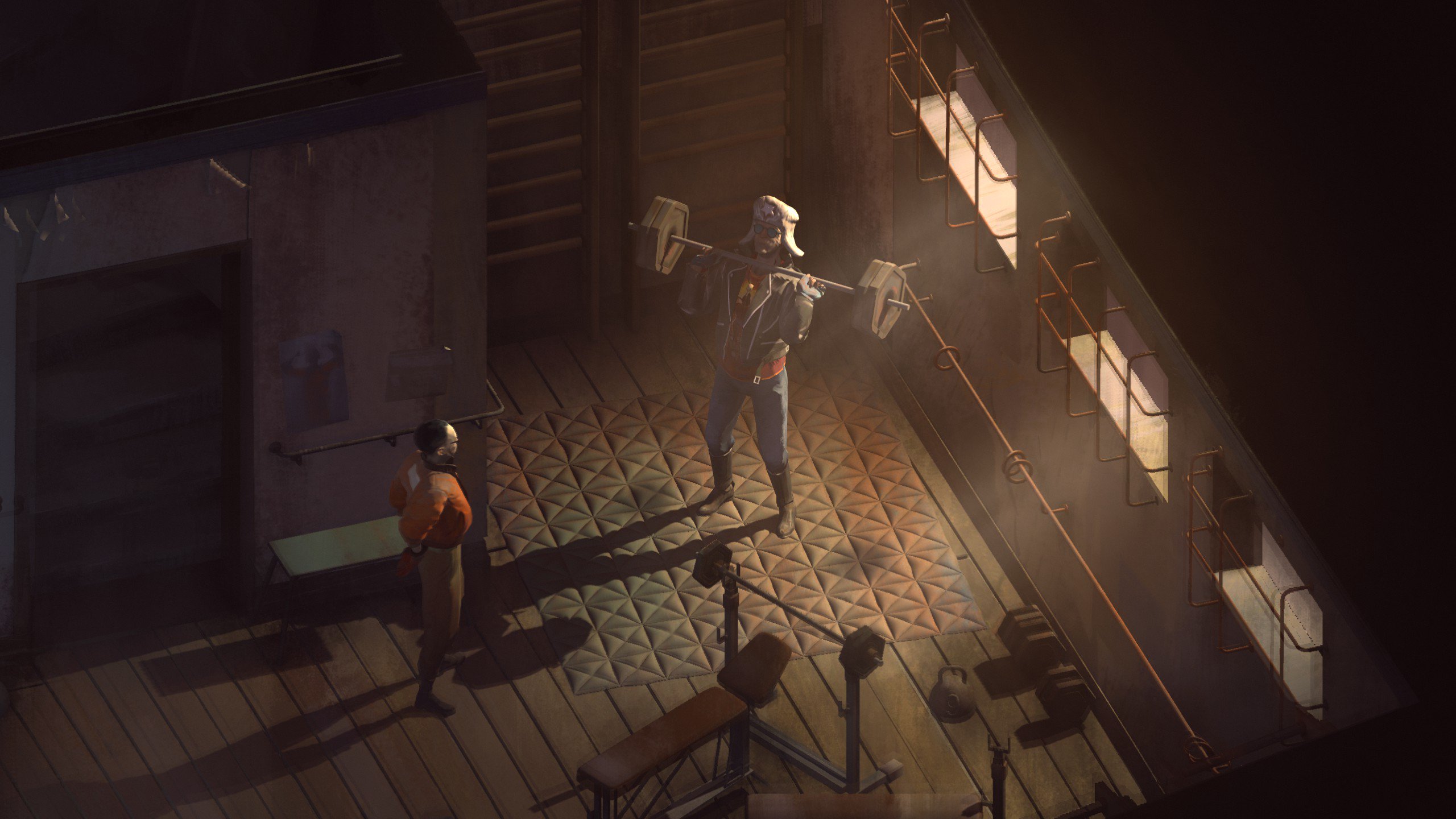After watching the explosive documentary on Disco Elysium's legal battle, I can't fathom how Disco Elysium 2 will ever be made
No one comes off well here except for the developers caught in the middle.

Gaming YouTube channel People Make Games has released a massive two-and-a-half hour-long investigation into the legal battle over new-school PC gaming favorite, Disco Elysium, which has seen the game's creative leads go to war with developer ZA/UM's corporate ownership for control of the game and its future sequel.
The short version of the dispute is that three of the senior most members of Disco Elysium's dev team, including Robert Kurvitz, who began crafting the setting 20 years ago, left ZA/UM on bad terms at the end of 2021. Those developers say they were forced out when they discovered a scheme by a trio of investors to steal the company out from under them, while the CEO they accuse claims they were fired for failing to meet basic obligations as developers and for creating a toxic work environment.
PMG spoke to all parties involved: not only the shareholders with claims to ZA/UM and the Disco Elysium IP, but 16 current employees, including four who went on the record and had interviews taped for the documentary.
Throughout the dispute, Kurvitz has presented his story as one of a punished artist struggling against anti-creative capitalists, but whether or not that's true, the video is as unflattering to Disco Elysium's ousted creatives as it is to the executive who pushed them out—longtime collaborators at ZA/UM are highly critical of the former leads and wearied by the ongoing turmoil. Kurvitz maintains that this is all a tactical distraction designed "to create division between workers."
Complaints about creatives
In addition to the 12 ZA/UM employees who remained anonymous, PMG spoke to multiple named employees. Disco Elysium writer Argo Tuulik wrote iconic characters and scenes in Disco Elysium like Cuno, the Hardie Boys, and the Tribunal. He was a longtime associate of Kurvitz and Rostov dating back to the early 2000s, but said he felt the way Kurvitz presented the events at ZA/UM was "dishonest and manipulative."
I don't think he understood that to lead is a burden, not a privilege."
Argo Tuulik
Tuulik still has a fondness for Disco Elysium's early days: "It's the hardest thing I've ever done in my life, but it's also the funnest thing I've ever done in my life." He also expresses even further nostalgia for his first tabletop sessions in the Elysium setting DM'd by Kurvitz, and still praises him as an artist: "I played Dungeons and Dragons maybe with five, six different Dungeon Masters. No one comes close to Robert's storytelling ability.
"I think Robert has this uncanny ability to conceptualize things that already exist in a way that they seem completely fresh and new."
Keep up to date with the most important stories and the best deals, as picked by the PC Gamer team.
At the same time, Tuulik is critical of Kurvitz' management style and stance toward the press. When presented with a 2019 Rock Paper Shotgun interview where Kurvitz claimed to have written "about half of the million words in Disco Elysium," Tuulik responded, "I don't think that's true. It doesn't seem fair. It's not strange to hear that, because I've heard these crooked estimations before. I've heard worse ones."
Tuulik continues: "The Thing with Robert is that he has this natural charisma, he's an incredibly magnetic person… but it's easy to confuse this with leadership skills.
"I don't think he understood that to lead is a burden, not a privilege."
Tuulik, as well as ZA/UM lead artist Kaspar Tamsalu and Disco Elysium writer/editor Justin Keenan, described the situation at the company as being fluid and confused after the shipping of Disco Elysium, with Kurvitz, Rostov, and Hindpere taking a sequence of sabbaticals during a period of extensive growth and change.
Tamsalu, a childhood friend of Rostov and member of the art team on the original game, attests to Rostov and Kurvitz "checking out" of the studio for a lengthy sabbatical during a critical time—ZA/UM grew rapidly from 30 to 100 employees in 2021. "We needed processes, we needed to work on the studio culture, all kinds of policies," Tamsalu explained.
"I think the two month vacation to top everything off was really difficult for myself and some others to swallow."

Final Cut writer and editor on the original game Justin Keenan echoed Tamsalu's frustrations with Kurvitz' mercurial nature, describing an incident where Kurvitz requested writing tests from writers at ZA/UM who had already worked on the Final Cut, told Keenan they were insufficient, and requested that he inform those writers they would not have main writing team duties on the sequel project. Kurvitz then supposedly informed one of those writers that he had never even read the sample, and had actually just dismissed it out of hand. Keenan was similarly frustrated with long sabbaticals taken from other senior members, describing an "coterie" of developers favored by Kurvitz at the expense of others at ZA/UM.
Kurvitz would later defend his time taken off work as being what he was legally entitled to under UK labor law, and described the development of Disco Elysium as particularly grueling on himself and Aleksander Rostov, with Tuulik noting in his interview that the final crunch on Disco Elysium was particularly difficult for Rostov, and the artist himself stating he suffered adverse psychological effects from it for a long time after.
I think it's entirely understandable how the fans have responded. If I had been outside, I'm pretty sure I would have responded the same way."
Petteri Sulonen
ZA/UM chief technologist Petteri Sulonen, who has playtester and "special thanks" credits on the original Disco Elysium, was highly critical of Kurvitz' behavior: "When it finally happened, no, I wasn't surprised, and I think, in retrospect, that any other solution or any other outcome would have meant that Robert would really have had to change fundamentally in many ways how he relates to his coworkers and how he relates to their labor."
Additionally, Sulonen alleges that Kurvitz approached him shortly before leaving ZA/UM with a request for Disco Elysium's source code, a request that, if fulfilled, Sulonen believes would have cost him his job. This fact was not known to Ilmar Kompus at the time of Kurvitz' termination, whose original justification as recounted by Kurvitz was "attempted theft of IP" to sell to another company, and while there could be a number of explanations for Kurvitz' request and he was one of the artistic progenitors of the IP, it was still an alarming imposition for Sulonen.
As a final note on the ZA/UM employees, all four reported receiving death threats from fans of the game who viewed them as having betrayed Kurvitz, Rostov, and Hindpere, and said that their hesitancy to speak on the record about these events stemmed from the toxic climate around the conversation as much as professional concerns. With that being said, Tamsalu and Sulonen describe sympathizing with fans viewing these events from outside the company, and not liking how things turned out, with Tamsalu stating: "If I had been on the outside, if my final word had been no to Rostov when he invited me back, I might believe him today. But I was there in the trenches doing the work, dealing with their bullshit, and they just didn't care about anyone else at all."
"I think it's entirely understandable how the fans have responded," Sulonen explained to PMG. "If I had been outside, I'm pretty sure I would have responded the same way. But it has felt really unfair."
Accusations of financial malfeasance
PMG's conversations with current ZA/UM CEO Ilmar Kompus, as well as Rostov and Kurvitz, are more illuminating for what they lack than their actual content. Kompus has a lot to say about Rostov, Kurvitz and Hindpere as employees, but largely deflected PMG's inquiries into how he acquired his majority stake in ZA/UM, which is where Rostov and Kurvitz say the malfeasance happened. Specifically, Kompus is accused of "purchasing" a small piece of Disco Elysium 2 concept work for €1 and selling it back to the company for €4.8 million. This was the central claim of Disco Elysium producer Kaur Kender's since-withdrawn lawsuit against the company.
Kompus insists that he had secured verbal agreements from the other shareholders for his acquisition of a majority stake in ZA/UM following the departure of mega investor Margus Linnamäe, which included giving Kurvitz and Rostov stake in a holding company with IP related to Disco Elysium 2. Kompus is unable to provide documentation of these agreements, which as PMG points out is mystifying behavior from an experienced businessman operating at this level.

This is to say nothing about the involvement of Estonian businessman Tõnis Haavel, who was found liable for millions of euros related to a high-profile investment fraud case in Estonia. Haavel would eventually declare bankruptcy in Latvia, and in a statement to PMG asserted that, "Since the civil claim of 11M was sentenced to be paid jointly by several persons, I have no way to know how much other sentenced persons have paid them but I do know they got all my assets."
Haavel asserts that he did not declare bankruptcy in another country to shield his assets from Estonian courts, while PMG reports that Haavel appears to have distributed assets and stakes in valuable ventures among close associates (including Ilmar Kompus) in-between the implosion of his Azerbaijani land deal in 2008 and the court's ruling against him a few years later. PMG also reports that a portion of ZA/UM's UK subsidiary is owned by Haavel's romantic partner, Anu Reiman, and that this is potential evidence of Haavel as a "shadow shareholder" in ZA/UM through Reiman, with these payments and assets obfuscated from the Estonian government.
The explosive success of Disco Elysium catapulted its scrappy, punk development team, as well as the shady financiers they had as bedfellows, to dizzying heights of international attention and scrutiny. The alarming details surrounding Kompus and Haavel are further complicated by testimony from the developers PMG interviewed that they were genuinely active partners in Disco Elysium's development—Haavel himself, of all people, is pointed to as an effective organizer and producer.
The presence of Estonia's most famous perpetrator of investment fraud among those accused by Kurvitz, Rostov, and Hindpere of stealing ZA/UM is eyebrow raising to say the least, and the ousted developers' case against the company seems to depend on whether they can prove Kompus did not adequately inform them of his plans and indeed, purchased IP from the company for €1 and sold it back for €4.8 million to secure the funds to buy his majority stake—did these events go down in this way, and if so, is it the sort of ethically dubious financial jiu jitsu our legal system frowns upon, or just the normal, pedestrian kind we've all become inured to?
What comes next?
It's not clear where anyone goes from here, no matter where the rights end up after potentially years of legal battle. ZA/UM's next game, whenever it releases, whether a Disco Elysium sequel or some other project, will have this mess hanging over it if Kurvitz, Rostov, and Hindpere are not involved, or, as Kurvitz mockingly puts in his interview, they don't give a "these guys are ok" sort of public statement. It's not clear that Disco Elysium's fanbase would ever accept such a thing, no matter how many longtime developers like Tuulik, Keenan, Solonen, or Tamsalu are involved with it—I'm not sure I'd feel comfortable with another Elysium-set game in this scenario either.
But while Hindpere came off as introspective and open to her former colleagues' critique in conversation with PMG, Rostov and Kurvitz avoided directly responding to criticisms from the likes of Tuulik, instead responding with assertions of their own hardship in shipping Disco Elysium and returning to the core claim that their company and their life's work was stolen from them.

In a later comment sent to PMG, Kurvitz stated: "This last-minute push is an attempt by Kompus and Haavel—direct superiors of the people commenting here—to create division between workers. To bait us into a public war of words in order to direct attention from their suspected criminal activity. I will not participate in it."
Kurvitz, Rostov, and Hindpere's abilities as leaders and managers is an issue distinct from the question of whether Kompus and Haavel broke the law to steal ZA/UM and the Disco Elysium IP. But Kurvitz's dismissal of his former artistic collaborators' credible complaints as dishonest posturing on behalf of their capitalist masters only serves to make those complaints more credible.
Kurvitz was more keen to counter Kompus' claims that he and Rostov had attempted to sell Disco Elysium or aspects of it to Ubisoft, Microsoft, Larian, or, bizarrely, Fallout New Vegas and Pentiment project lead Josh Sawyer. Not Obsidian, just Josh Sawyer (which the developer flatly denies). To extend the benefit of the doubt to Kurvitz and Rostov, they argue that the public litigation of their ability and fairness as leaders was introduced as a post-facto justification for their ouster, and that the initial reason for their firing was this accusation of IP theft, one they say is patently false. They express a sense of moral indignation of their conduct being put into question when they see their life's work having been taken away.
While I'm sympathetic to that sense of righteous outrage, especially given their decades-long effort to craft this setting, I still hoped for or even expected more introspection and accountability to their former colleagues and friends. How would the 100 current employees at ZA/UM feel about working with them again, should they somehow win back the company after years of legal proceedings? Do Kurvitz and Rostov plan on starting over with an entirely new team at new studio Red Info, should they win back the IP, and what would that look like, knowing that Disco Elysium's development was a grueling ordeal that nearly failed multiple times? The anecdotes of Kurvitz and Rostov's former colleagues speak to the artists struggling to adapt to a more traditional, corporatized game dev environment, while Disco Elysium seems to have been a minor miracle delivered by a hungry, even desperate crew of artists, many of whom had known each other for years—a hard thing to whip up from scratch a second time.
I don't want to dismiss the strange cloud hanging over Haavel's involvement, or the seriousness of Kurvitz, Rostov, and Hindpere's allegations against Kompus, but barring some manner of compromise or settlement between the parties involved in the dispute—which seems impossible, as the situation currently stands—it looks right now like winning the legal battle for Disco Elysium would be a pyrrhic victory no matter who came out on top.
The Disco Elysium saga in brief
- Early 2000s: Disco Elysium lead writer Robert Kurvitz organizes first Elysium setting tabletop games with other anarchist punks in Tallinn, Estonia.
- Late 2000s: ZA/UM initially coalesces as an artist collective in Estonia.
- 2013: Robert Kurvitz publishes Sacred and Terrible Air, a novel and the first commercial work set in the Elysium setting.
- 2016: First public reveal of Disco Elysium as "No Truce With the Furies" (archived on Reddit) with predicted EOY 2016 release. Producer Kaur Kender is involved since earliest stages creatively and managerially, with further investment from Tõnis Haavel, eventual CEO Ilmar Kompus, and Estonian capitalist Margus Linnamäe. ZA/UM is initially headquartered out of a leaky basement
- 2019: Disco Elysium launches to critical acclaim.
- Developer interviews in the PMG documentary suggest it was a grueling development with "nine months of crunch" preceding release.
- March 2021: Disco Elysium: The Final Cut, a definitive edition of the game releases. Helen Hindpere is credited as lead writer, with Kurvitz and Rostov supposedly working on a sequel.
- Fall 2021: Project lead Kurvitz, lead artist Aleksander Rostov, and writer/Final Cut lead writer Helen Hindpere "involuntarily" leave the company.
- June 2022: Kurvitz and Rostov found a new development house, Red Info Ltd., with backing of Chinese publisher NetEase.
- October 2022: Disco Elysium editor and former ZA/UM member Martin Luiga reveals the trio's departure, subsequently confirmed by ZA/UM and a letter from Rostov co-signed by the other two.
- Trio alleges unfair ousting, as well as misappropriation of €4.8 million from ZA/UM to purchase majority share in company by CEO/investor Kompus and fellow investor Haavel with support from investor/Disco Elysium producer Kaur Kender.
- Kompus, via ZA/UM, alleges toxic management style, belittling of female employees, attempted IP theft, and other abuses by Kurvitz and Rostov. GamesIndustry.biz cites an unknown number of anonymous sources to at least partially corroborate the narrative.
- Kender sues Kompus and ZA/UM over misappropriation of €4.8 million, Kurvitz and Rostov file their own, separate suit against the company.
- December 2022: Kender withdraws suit against ZA/UM, citing return of funds by Kompus, with no elaboration as to why he had the €4.8 million in the first place. Since this time, PMG reports that Kender sold his remaining stock in ZA/UM to Kompus.
- May 2023: People Make Games documentary featuring interviews with both parties in the legal battle, as well as developers still at ZA/UM, releases.
Ted has been thinking about PC games and bothering anyone who would listen with his thoughts on them ever since he booted up his sister's copy of Neverwinter Nights on the family computer. He is obsessed with all things CRPG and CRPG-adjacent, but has also covered esports, modding, and rare game collecting. When he's not playing or writing about games, you can find Ted lifting weights on his back porch.

